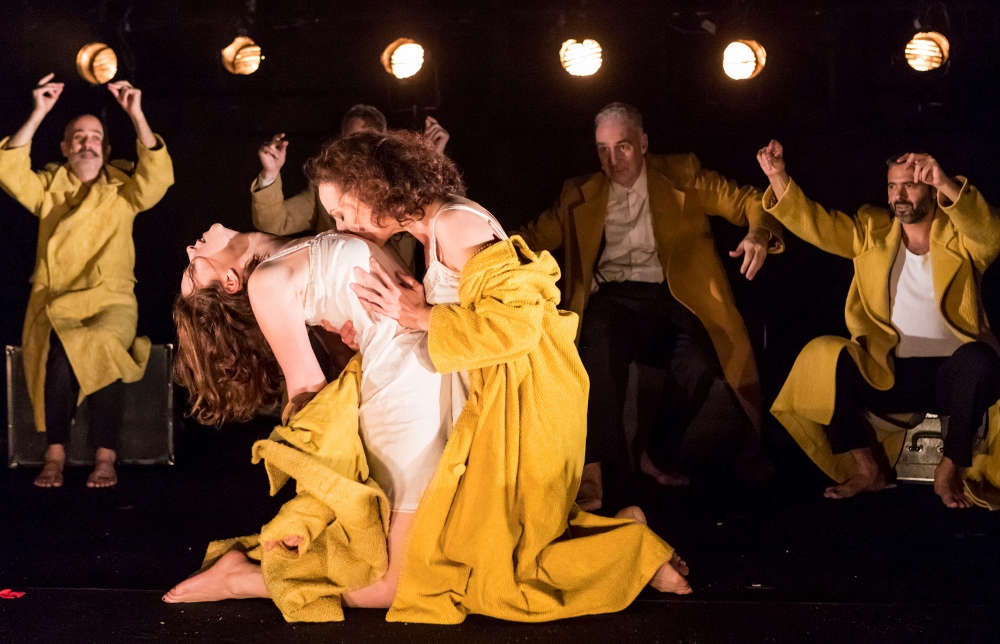
Indecent is a play concerned with the power of art and words, and it is also a love story, the exhilarating experience of falling in love with theatre. It’s a play about a controversial play – God of Vengeance by Sholem Asch – and its history, with a narrative arc that bounces between languages, locations, and time. Originally conceived and directed on Broadway by Rebecca Taichman, and written by Paula Vogel, Indecent is based on real-life events, yet takes off from there to create a theatrical work that merges fiction with historical fact to raise issues of freedom of speech, culture, and the relationship of a work of theatre to its creator, the people who bring it to life in the theatre, and its audience. The Cameri Theatre production, directed by Yair Sherman, and translated by Joshua Sobel, is moving and thought-provoking, marked by excellent performances, and very timely in the midst of current discourse on issues of freedom of speech, the power of art, and the role of artists in the community.
Indecent opens with an actor’s troupe rising up from their graves, introducing them is Lemel (Vilozny), the stage manager. This frame gives the play structure, offering coherence within the huge leaps of time (as it moves from 1906 to 1952) and place. It also connects the individual story to wider, universal issues. The actors rising from their graves are in a way ‘any and every actor’ and they take on many different roles within the play, with all the actors onstage throughout. The set design supports the sense of timelessness, with an almost empty stage, and trunks that take on different functions. The heart of the play is in Lemel’s introduction, as he says: “We have a story we want to tell you about a play — a play that changed my life.”
God of Vengeance, written when Sholem Asch was just twenty-one, is controversial in its exposure of hypocrisy and greed within the Jewish community. The protagonist Yankl, owns a brothel, while he lives with his wife Sure (a former prostitute) and their cherished daughter Rifkele on the floor above. Even more radical is the relationship that develops between Rifkele and Manke, one of the prostitutes. It would be a daring story to tell today as well; in 1906 it was outrageous. Yet the play did enjoy great success, and even made it to Broadway in an English translation in 1923. The tale of that production provides the title for Vogel’s play, as the entire cast was arrested on obscenity charges and found guilty; although the conviction was later reversed on appeal. It’s a fascinating story that raises many questions, especially as the English version of the play was edited; specifically: redacting the lesbian love story.
Music is an essential aspect of the play, with songs creating an emotional connection between the different sequences. An excellent live band performs onstage throughout, and striking arrangements of familiar songs make a profound impact, such as Dudu Niv and Esti Kosovitsky’s somber performance of Ain’t We Got Fun in clown gear, Michal Weinberg’s rap rendition of Aaron Lebedeff & Alexander Olshanetsky’s What can you mach? S’is America, and Eli Gornstein’s moving Bei Mir Bist Du Shein, accompanying himself on the cello.
Love between women has rarely been portrayed so eloquently as in Asch’s play, and the ‘rain scene’ in God of Vengeance is significant to Indecent, in its absence and in its presence. Ultimately performed by a troupe of actors in the Lodz ghetto during WWII, it is one of the most moving moments in the play. Indecent echoes the love between Rifkele and Manke in the relationship of the two actors who portray them in the New York production, as performed by Dana Meinrath (Ruth) and Michal Weinberg (Dina) respectively. The difficulties of coping with a new language – English, and the yearning for acceptance and validation are woven into the tale of the compromises and capitulations on the way to the Broadway production.
Vilozny is a gifted comic actor and he brings those strengths to his portrayal of Lemel, who enters this story as someone’s tag-along cousin, and is swept away by the beauty and daring of Sholem’s Asch’s play. As God of Vengeance goes on from that first reading to performances in Berlin and other European cities, and from there to America, and Sholem Asch (first portrayed by Dan Shapira, then Eli Gornstein) goes from an ardent young writer to a conflicted, mature man, devastated by all he has seen, the viewer follows Lemel’s narrative arc as well. Asch, haunted by the tragedy of the Holocaust, refused in his later years to permit God of Vengeance to be performed.
Should art be bound by prevailing community standards? Loyalty to protecting the image of one’s family, community, religion, nation? Or rather, should art endeavor to explore, reveal, discover truths, no matter how painful or difficult to contend with? Should there be limits to what can be said or shown, and if so, who has the authority to define those limits? These are some of the questions raised by Indecent, and there are no easy answers. Yet within this conflicted moral space, Indecent is also an affirmation and celebration. Although the battle is bitterly waged, onstage and in the contemporary public arena, one might take encouragement that both sides of this battle have a shared belief: the power of art to change lives.
Indecent
Written by Paula Vogel; Translated by Joshua Sobel; Directed by Yair Sherman; Original Music and Arrangements: Eldad Lidor; Costumes: Yehudit Aharon; Video Art: Nimrod Zin; Lighting: Nadav Barnea; Sound: Naor Izsak; Vocal Arrangements, Vocal Coach, German and Yiddish Coach: Alexander Fisz; Assistant Director: Nitsan Noiman; Cast: Shmuel Vilojny – Lemel/Lou, Eli Gornstein – Elderly Men, Esti Kosovitsky – Elderly Women, Dudu Niv – Adult Men, Michal Weinberg – Adult Women, Dan Shapira – Young Men, Dana Meinrath – Young Women; Musicians/Actors: Alexander Fisz – Concertina, Piano, Vocals; Arik Livnat – Saxophone, Shofar, Flute, Harmonica, Piano; Yoav Asif – Keyboards, Guitars, Percussion.
Original Broadway production directed and conceived by Rebecca Taichman, score and original music by Lisa Gutkin and Aaron Halva.
Read the Midnight East review of God of Vengeance here.





